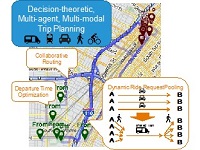Collaborative Optimization and Planning for Transportation Energy Reduction (COPTER)

Technology Description:
Palo Alto Research Center (PARC) will develop its COPTER system to identify the energy-efficient routes most likely to be adopted by a traveler. PARC’s system model will use currently available data from navigation tools, public transit, and intelligent transportation systems to simulate the Los Angeles transportation network and its energy use. For its control architecture, PARC will leverage its expertise in behavioral modeling and use machine-learning algorithms to predict the near-time travel needs of users, their constraints, and how likely they are to respond to suggested travel options. The system would send users recommendations for energy-efficient trips before departure, and could provide real-time guidance to users if adjustments in a trip need to be made to account for traffic or other unexpected interruptions. Unlike existing platforms, PARC’s technology will be able to optimize for multiple travelers at the same time, organized by their most likely corridors of travel. This would prevent travelers from all pursuing the same alternative, which could cause additional traffic, and would also create dynamic ride-sharing options. By improving travelers’ quality of service, PARC believes no further incentives are needed to encourage users to adopt the suggestions pushed to their smartphone.
Potential Impact:
If successful, PARC’s system will demonstrate that energy-efficiency gains in personal transportation can be accomplished through network controls that encourage individual travelers to take specific, energy-relevant actions.
Security:
PARC’s system could facilitate a reduction in transportation energy use and help reduce demand for imported oil.
Environment:
More efficient transportation networks will minimize energy consumption, resulting in improved air quality and lower greenhouse gas emissions.
Economy:
PARC’s system could help reduce congestion in metro areas without requiring investment in new infrastructure. A more efficient transportation network could further improve the overall productivity within a regional transportation network.
Contact
ARPA-E Program Director:
Dr. Patrick McGrath
Project Contact:
Dr. Matthew Klenk
Press and General Inquiries Email:
ARPA-E-Comms@hq.doe.gov
Project Contact Email:
klenk@parc.com
Partners
Virginia Tech Transportation Institute
Related Projects
Release Date:
11/10/2014
